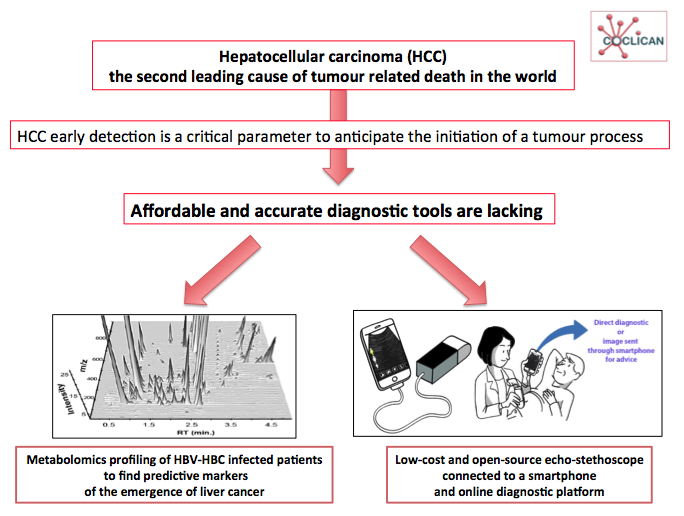Hepatocellular carcinoma (HCC), the main form of primary liver cancer, is the second leading cause of tumor-related death in the world. The burden of HCC in developing countries represents a major challenge in global public health for the oncoming decades. Incidence of HCC is closely associated with the distribution of hepatitis B (HBV) and C (HCV) viruses. Clinically, HCC patients have a very poor prognosis and high 5-year mortality rate except when detected early.
As a result, HCC early detection is a critical parameter to anticipate the initiation of a tumor process, but affordable and accurate diagnostic tools are lacking.
COCLICAN proposes to tackle this issue by building a collaborative network of researchers and clinicians in three continents: Europe, South America, and Asia.
This international team will analyze and compare metabolomic profiles of a consistent cohort of HBV-HBC infected patients to delineate molecules which are predictive of the emergence of liver cancer.
They will also assess the performance of a low-cost and open-source echo-stethoscope connected to a smartphone, specially adapted to low-income countries.
COCLICAN has been designed to enhance research collaborations, to improve innovation potential at the European and global levels and to respond to the health needs of underserved populations.
| Régions d'intervention |
|
|---|---|
| Secteurs d'intervention |
|
| Thématiques transversales |
|
| Dates de réalisation | du : 01/11/2018 au : 01/07/2021 |
| Source de financement | Marie Sklodowska-Curie Actions (MSCA) – Research and Innovation Staff Exchange - RISE. This project has received funding from the European Union’s Horizon 2020 research and innovation programme under grant agreement N° 823935 |
| Montant du financement | 460.000 euros |
Téléchargements :
Aucun fichier